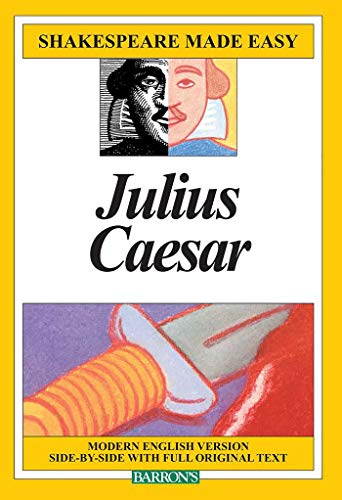Julius Caesar (Shakespeare Made Easy)
William Shakespeare
BOOK REVIEW

In the realm of dramatic literature, few names resonate with as much power as William Shakespeare, and none spark quite the fervor of Julius Caesar. This play is not merely a historical recounting but a visceral exploration of ambition, betrayal, and the dark underbelly of politics-told through the lens of the rich tapestry of Roman history. This particular edition, Julius Caesar (Shakespeare Made Easy), presents the tragic events with clarity, ensuring that the exquisite, poetic language of Shakespeare is accessible to a wider audience, even those who may be intimidated by the Elizabethan tongue.
Let's dive deep into the heart of this narrative, where the ambitions of men clash with their moralities, and friendships dissolve under the weight of political maneuvering. At its core, the story of Julius Caesar is a cautionary tale about the precarious nature of power and the fragility of loyalty. The titular character, a celebrated military leader, encapsulates both the hope and the fear that come with authority, as he finds himself at the center of a conspiracy plotted by those closest to him, including Brutus, whose internal struggle amplifies the tension of the narrative.
What makes Julius Caesar not just a retelling of a historical figure's demise but a haunting reflection of human nature is how Shakespeare draws us into the emotional turbulence of his characters. As every conspiratorial whisper unfolds, we are thrust into the whirlwind of treachery that spirals towards the assassination at the Senate-an act that detonates chaos upon Rome. The audience witnesses Brutus's profound conflict as he navigates his love for Caesar against his devotion to the Republic, a tension that encapsulates the dichotomy of trust and ambition. This duality resonates deeply, echoing in today's political landscape where loyalty is tested daily under the glare of ambition.
Readers often reflect on the vividness of Shakespeare's characters in this play, noting how each role transcends its historical roots to mirror contemporary issues of power and the moral quandaries of leadership. With commentary both passionate and critical, some viewers argue that the play's brilliance lies in its relevance-how the themes of betrayal and ambition echo throughout history, resurfacing in modern politics. Others espouse that the accessibility of this adaptation makes Shakespeare's intricate language a gateway to understanding the human condition.
As the plot cascades toward its devastating climax, one cannot ignore the multifaceted themes woven throughout the narrative. The ominous warnings of the soothsayer, "Beware the Ides of March," become a haunting bell tolling for both Caesar and the conspirators, exemplifying the play's exploration of fate versus free will. In a world grappling with the implications of choice and consequence, readers are left pondering the moral ramifications of their decisions-a reflection on how history is shaped by the actions of both the noble and the treacherous.
Critics and fans alike revel in Shakespeare's ability to tap into the zeitgeist of humanity, crafting dialogue that resonates through centuries. His work has not only influenced playwrights and poets but has also pervaded the fabric of modern storytelling-echoing through films, novels, and political discourse. The character of Caesar, in his pride and subsequent fall, continues to serve as a powerful archetype for both leaders and the led, prompting introspection in readers and audiences. The play serves as a mirror, reflecting the duality of man; heroism and vulnerability coexist within the same breath.
As we close the final act, there emerges an undeniable urgency to ruminate on the significance of Caesar's demise-not merely as a historical event but as a poignant reminder of the consequences of ambition unmoored from morality. This edition, accessible and thoughtful, invites you into a world where every betrayal stings, every ambition rings hollow in the face of death, and echoes through time. You cannot escape its gravity; Julius Caesar is not merely a part of the canon-it is a call to examine the very structures of power and loyalty that govern our lives today.
Don't miss the chance to delve into these interconnected stories, where the past is never truly past, and every act reverberates with the weight of consequence. As you navigate the trials of Brutus and the tragic end of Caesar, may you also find yourself reflecting on the potent questions of power and betrayal that reverberate into our own lives. Why not dive in and uncover how Shakespeare's insights can illuminate your own world? 🌌
📖 Julius Caesar (Shakespeare Made Easy)
✍ by William Shakespeare
🧾 256 pages
1985
#julius #caesar #shakespeare #made #easy #william #shakespeare #WilliamShakespeare